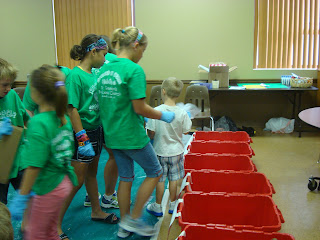Our Advent Scripture readings, hymns, and prayers emphasize
the themes of expectation, hope, and repentance.
Today’s reading from Jeremiah (
Jeremiah 33:14-16) is a
prophetic voice of hope in a situation that looked hopeless. People of faith
are people of hope. A gift people of faith can bring to conversations about the
environment – and especially about the climate crisis – is hope.
It’s simple math: we can burn less
than 565 more gigatons of carbon dioxide and stay below 2°C of
warming — anything more than that risks catastrophe for life on earth. The
only problem? Fossil fuel corporations now have 2,795 gigatons in
their reserves, five times the safe amount. And they’re planning to burn it all
— unless we rise up to stop them.
An article
published today by Seth Borenstein of the Associated Press
drawing on new international calculations on global emissions published Sunday
in the journal
Nature Climate Change
says that rather than decreasing the amount of greenhouse gases, in the past
year the amount increased by 3 per cent. The study’s lead author, Glen Peters at the Center for International Climate and Environmental Research in Oslo, Norway, says that the only possible way to stay within the goal of two degrees of temperature rise is to start reducing these emissions now and “throw everything we have at the problem.” Given how little we have thrown at the problem up to now, it seems unlikely to happen now.
With 0.8 °C degree of warming, we have seen all sorts of extreme weather in 2012, including Superstorm Sandy, the drought in the Midwest, and wildfires such as the one that forced evacuations around Estes Park, Colorado, this weekend. Imagine what two degrees would bring! Some scientists have said that
reaching even the two degree limit would be disastrous , but it’s clear that our earlier failure to notice the signs and turn things around makes it nearly inevitable. Anything beyond two degrees changes our world in even more extreme ways, ways that are nearly unimaginable.
In today’s Gospel lesson (
Luke 21: 25-36) ,
Jesus talks about paying attention to signs that are right in front of us, signs that people tend to deny or ignore. He describes distressing, fearful times and then says (Luke 21:28):
“Now
when these things begin to take place, stand up and raise your heads, because your
redemption is drawing near.”
In Omaha last night, Bill McKibben said that even though the
information he was presenting was very discouraging, he found it exciting in a
way because we are getting “nearer to the heart of things”. And we are indeed
down to what is essential to survival; we are down to questions of meaning and
questions about our priorities; we are down to questions about where our hearts
lie when we face the finitude not only of our own lives but of our biosphere,
our planet, and the way of life it has supported. Our search for hope in this
seemingly hopeless situation leads us to a place of repentance and conversion: Are we
willing to do what it takes to make hope possible?
The Do the Math campaign is taking a page from the
anti-apartheid campaign and asking institutions – including religious
institutions – to freeze new investments in the fossil fuel industry and then
to fully divest themselves of all fossil fuel investment within five years
unless those companies change their way of doing business. When energy companies are
willing to leave most of their current reserves underground, to stop exploring
for new hydrocarbons, and to stop lobbying for special breaks and for the
defeat of legislation that would promote a switch to other forms of energy, in
short, when the fossil fuel industry puts life ahead of profits, then
divestment will become unnecessary.
Bill McKibben said that people tell him this sort of campaign
is impossible, that it’s a “David and Goliath” situation. He said these words
were discouraging until he though, “Wait a minute! I’m a Methodist Sunday
School teacher; I know how the David and Goliath story ends!” We know not only how that story ends, but how the entire salvation story ends, and that is why we hope when all seems hopeless.
The questions we must answer are Advent questions; the
journey of the heart we take to repent and turn ourselves and the world around
is an Advent journey. Where do our hearts lie? How do we hope when everything
seems dark? Can we set aside lesser priorities of personal convenience and
comfort in order to do what needs to be done for the greater common good both
close to home and in corners of the globe about which we know very little?
Almighty God, give us
grace to cast away the works of darkness, and put on the armor of light, now in
the time of this mortal life in which your Son Jesus Christ came to visit us in
great humility…(From the Collect for the First Sunday of Advent)






















